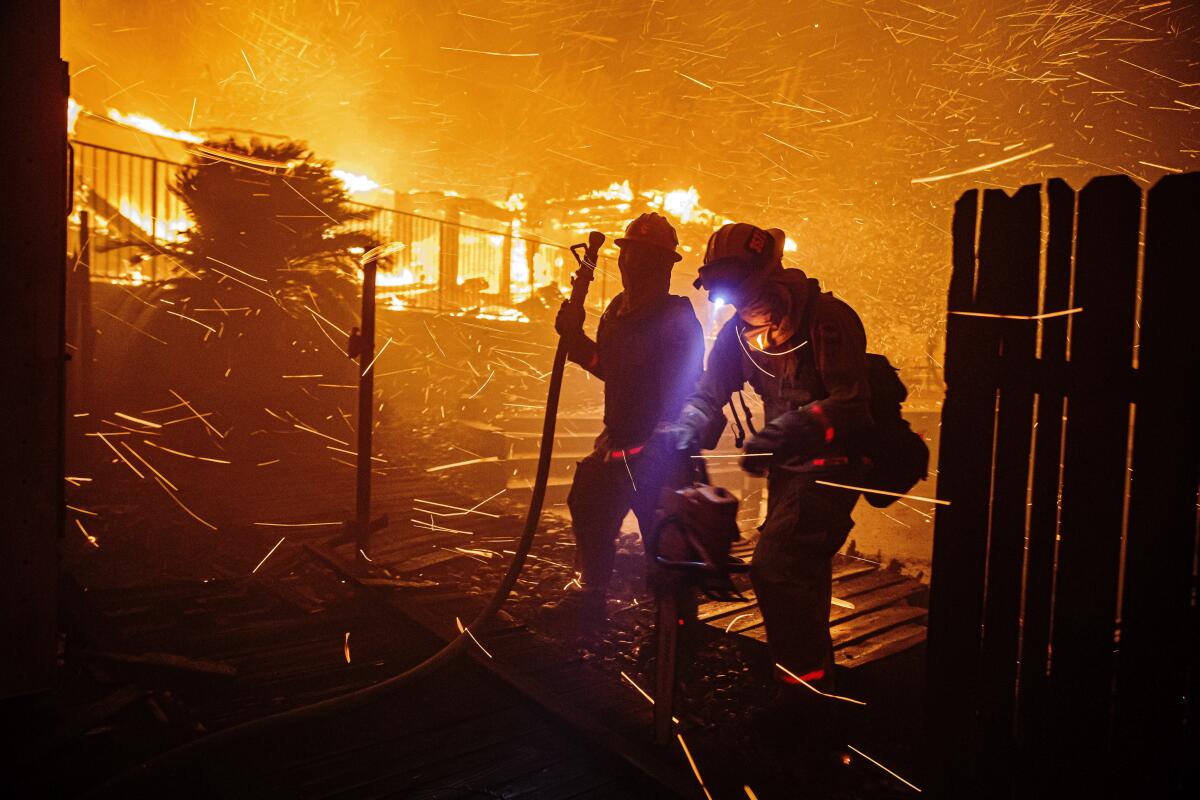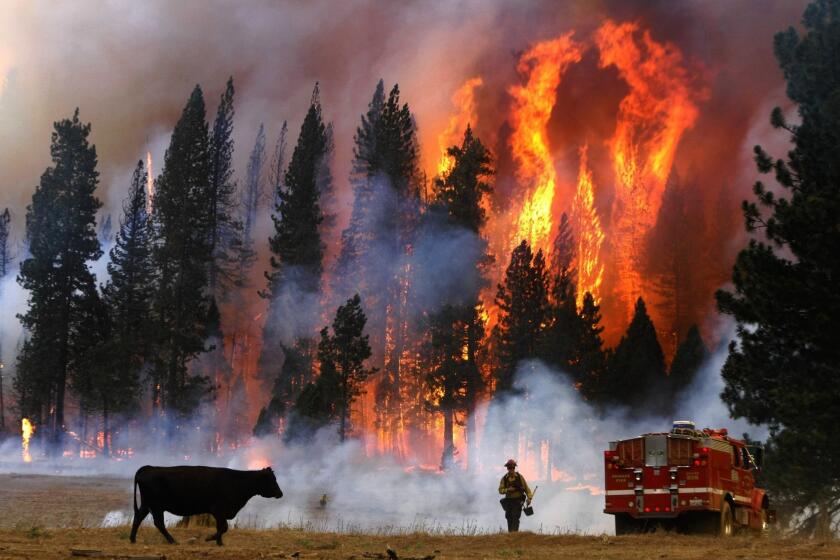Don’t just cheer wildland firefighters as heroes. Give them affordable healthcare

- Share via
The 2020 wildfire season is expected to be like none in recent memory. Above-average high-intensity fire risks are expected throughout the Pacific Northwest and Northern California; crews are already being dispatched. This summer, in the middle of the coronavirus pandemic, our nation’s wildland firefighters will be asked to expose their lungs and immune systems to grueling days working in fire, smoke and soot to protect public lands.
Without significant shifts in the way fires are managed and an immediate expansion of healthcare coverage options, wildland firefighters — despite their generally young age — will be disproportionately vulnerable to COVID-19-related complications and hospitalization. Meanwhile, their prolonged exposure to smoke and other health-compromising working conditions already puts them at a higher risk for chronic heart problems, respiratory issues and their associated illnesses.
As California’s wildfire season approaches, authorities are worried about their ability to muster a healthy firefighter force amid coronavirus crisis.
Banging on cans and cheering firefighters as heroes is a poor substitute for what they should clearly earn — year-round healthcare coverage.
Most federally employed wildland fire personnel are classified as “temporary seasonals.” These firefighters are typically hired to fight fires in the summer. They earn money primarily when assigned to a fire. Their jobs end with the fire season, and they are laid off in the winter months.
While working, they are eligible to enroll in the federal healthcare marketplace. After they are laid off for the off-season, typically from around November through May, firefighters lose access to subsidized premiums and wind up paying 70% to 75% more to maintain their coverage. Federal firefighters earn a modest and unpredictable income that varies season to season. Unable to afford the premium, many defer healthcare during the off-season. This means many if not most federal firefighters had to bear the risks of COVID-19 during the off-season this year without access to an affordable healthcare option.
The federal government has promised full coverage to wildland firefighters who contract COVID-19 while dispatched to a fire in federal jurisdiction. Veteran firefighters will tell you that determining liability on a forest fire is fraught with complications burdened with layers of bureaucracy. Minor injuries go unreported. Firefighters say they are often encouraged to “rub some dirt on it,” to avoid triggering an administrative investigation.
The promise of coverage is more illusory than real. A typical fire dispatch, or “tour,” lasts between one and 16 days, but it can take up to 14 days for COVID-19 symptoms to appear after exposure to the virus. These tours regularly include travel across state lines, and often involve work on different fires across several jurisdictions. In a complicated network of underfunded bureaucracies, with people coming and going and invisible infection risks, it will be nearly impossible to determine the source of infection and the liable party.
The healthcare landscape for those employed as contractors on the hundreds of private for-profit fire crews is even worse. Despite working primarily on state or federal land and absorbing the same risks as government crews, there is no federal code mandating coverage for temporary seasonal contract firefighters.
At the state level, the almost 2,600 California Department of Forestry and Fire Protection (CalFire) temporary seasonal workers trained for mixed structural and wildland fire positions will receive healthcare benefits this year but lose them in the off-season, as their federally employed counterparts do. The CalFire employees typically have a longer working season than most federal- and contract-employed seasonal fire personnel in roles designed primarily for structure protection. But few CalFire seasonal workers have off-season options for healthcare coverage.
On Tuesday, Covered California announced it is extending its COVID-19 special open enrollment through July. The program is working to enroll Californians who have lost healthcare coverage due to the disease. This year’s fire season is expected to last well past July, so more extensions would be needed for the state’s seasonal firefighters to apply once they are laid off.
Additionally, more than 2,000 prisoners are dispatched yearly by the state to fight fires alongside seasonal and full-time employees and are only paid between $2.90 and $5.20 a day, plus the possibility of an additional $1 per hour while working directly on the fire line — but they are eligible for healthcare year-round.
Regional teams are developing plans for social distancing and strategies to minimize direct smoke exposure for firefighters to reduce the COVID-19 risk. Wildfire crews crowd into dense camps across the U.S. where flu or summer cold viruses are widespread. Outdated federal guidelines on preparing for infectious disease and pandemic response have been updated after more than a decade on the shelf. Several U.S. senators have pressured fire officials to fund forestry-based treatments to reduce catastrophic fire risks and outfit firefighters with personal protective equipment in the COVID-19 era.
Tens of thousands of wildland firefighters in California and across the country face the invisible risk of a COVID-19 outbreak this fire season. Many are priced out of an overburdened and underfunded federal healthcare system or essentially have no healthcare options. These workers should not be made to sacrifice more than they already do. Dignity on the front lines should mean that their service will be supported by dependable healthcare.
Congress can make this happen by passing legislation, the COVID-19 as a Presumptive Disease in Wildland Firefighters Act. Introduced last week, it would ensure coverage through workers’ compensation for wildland fighters by assuming those who test positive for COVID this summer did so while on the fire line.
State and federal lawmakers should also provide mandated insurance coverage for all those who fight fire or support fire operations on government land and extend the subsidized options through the off-season.
Give off-duty heroes what they deserve — affordable healthcare.
James F. Puerini, a former federal wildland firefighter, is pursuing a master’s of forestry degree with an emphasis on forest ecology in fire-dependent ecosystems at Yale School of the Environment. Gerald Torres is a professor of environmental justice at Yale School of the Environment and Yale Law School and is coauthor of “The Miner’s Canary.”
More to Read
A cure for the common opinion
Get thought-provoking perspectives with our weekly newsletter.
You may occasionally receive promotional content from the Los Angeles Times.







